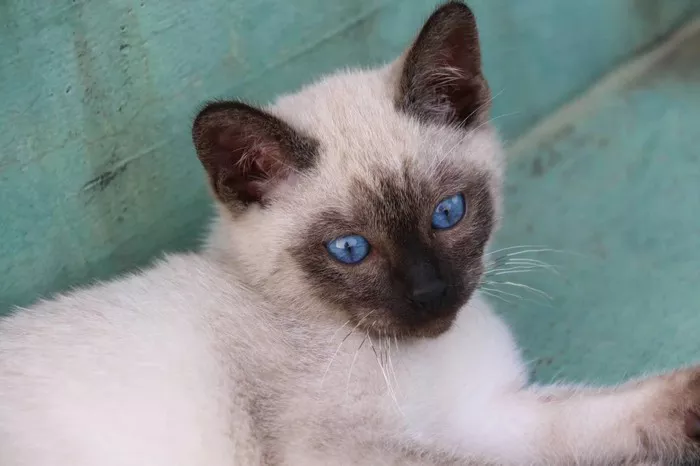Siamese cats are a popular and beloved breed known for their striking blue eyes, sleek coats, and distinctive personalities. Like any other cat breed, Siamese cats may be prone to certain health conditions. Understanding these potential health issues can help owners provide the best possible care for their Siamese companions. In this article, we will explore common diseases and health conditions that Siamese cats are more susceptible to, highlighting their characteristics, prevention strategies, and the importance of regular veterinary care.
Respiratory Conditions:
Siamese cats are more prone to respiratory conditions, such as upper respiratory infections and asthma. These conditions can cause symptoms like coughing, sneezing, wheezing, nasal discharge, and difficulty breathing. Good hygiene practices, including regular vaccination, minimizing exposure to other sick cats, and maintaining a clean living environment, can help prevent respiratory infections. If respiratory symptoms occur, seeking veterinary care promptly is essential for accurate diagnosis and appropriate treatment.
Dental Issues:
Siamese cats may have an increased risk of dental problems, including periodontal disease, gingivitis, and tooth decay. Poor oral hygiene can lead to dental pain, tooth loss, and other systemic health issues. Regular dental care, including toothbrushing, dental check-ups, and professional cleanings, is vital to maintaining good oral health in Siamese cats. Providing dental-friendly toys and a balanced diet can also help promote healthy teeth and gums.
Amyloidosis:
Siamese cats have a higher predisposition to a condition called amyloidosis. This is a genetic disorder characterized by abnormal protein buildup in organs such as the liver or kidneys. Signs of amyloidosis may include weight loss, poor appetite, excessive drinking and urination, and changes in behavior. Genetic testing and regular veterinary check-ups can aid in early detection and management of this condition.
Hyperthyroidism:
Hyperthyroidism is a common endocrine disorder in older cats, including Siamese cats. It occurs when the thyroid gland produces an excessive amount of thyroid hormones. Symptoms may include weight loss, increased appetite, restlessness, vomiting, and increased thirst and urination. Regular veterinary check-ups, including blood tests, can help diagnose and manage hyperthyroidism through medication, dietary changes, or other treatment options.
Gastrointestinal Issues:
Siamese cats may be more prone to certain gastrointestinal conditions, such as inflammatory bowel disease (IBD) and gastrointestinal cancers. These conditions can cause symptoms like chronic vomiting, diarrhea, weight loss, and decreased appetite. A balanced diet, regular veterinary check-ups, and addressing any dietary intolerances or allergies are important for maintaining gastrointestinal health in Siamese cats.
Feline Lower Urinary Tract Disease (FLUTD):
Siamese cats have an increased risk of developing FLUTD, which encompasses various conditions affecting the urinary tract, including urinary tract infections, bladder stones, and urinary blockages. Symptoms may include frequent urination, straining to urinate, blood in the urine, and inappropriate urination outside the litter box. Promoting hydration, providing a clean litter box, and ensuring a stress-free environment can help reduce the risk of FLUTD.
Genetic Disorders:
Siamese cats can inherit certain genetic disorders, such as progressive retinal atrophy (PRA), which causes vision loss, and hypertrophic cardiomyopathy (HCM), a heart condition. Regular veterinary check-ups, genetic testing, and responsible breeding practices are essential for identifying and managing these genetic disorders.
Preventive Measures and Care for Siamese Cats:
To promote the health and well-being of Siamese cats, consider the following preventive measures:
Regular Veterinary Care:
Schedule regular veterinary check-ups to monitor your Siamese cat‘s overall health, receive appropriate vaccinations, and address any health concerns promptly. Your veterinarian can provide guidance on preventive care tailored to your cat’s individual needs.
Nutrition and Weight Management:
Feed your Siamese cat a balanced and appropriate diet to meet their nutritional needs. Obesity can increase the risk of various health problems, so monitor their weight and provide portion-controlled meals. Consult with your veterinarian to determine the best diet plan for your cat.
Dental Care:
Implement a dental care routine that includes regular toothbrushing using cat-friendly toothpaste, dental treats, and dental check-ups. Maintaining good oral hygiene can help prevent dental diseases and improve your Siamese cat’s overall health.
Environmental Enrichment:
Provide environmental enrichment to keep your Siamese cat mentally stimulated and physically active. Engage them in playtime, provide interactive toys, scratching posts, and vertical spaces for climbing. Mental and physical stimulation can contribute to overall well-being.
Stress Management:
Minimize stressors in your Siamese cat’s environment, as stress can impact their overall health and make them more susceptible to certain conditions. Provide a quiet, safe space for your cat and ensure they have opportunities for rest and relaxation.
Conclusion:
Siamese cats are cherished companions known for their unique personalities and striking appearance. While they may be predisposed to certain health conditions, responsible ownership, regular veterinary care, and preventive measures can help promote their overall well-being. Understanding the potential health issues specific to Siamese cats, such as respiratory conditions, dental issues, amyloidosis, hyperthyroidism, gastrointestinal issues, FLUTD, and genetic disorders, allows owners to be proactive in their care. By providing a nurturing and supportive environment, addressing any health concerns promptly, and adhering to preventive measures, Siamese cat owners can ensure their feline friends lead happy, healthy lives for years to come.


























